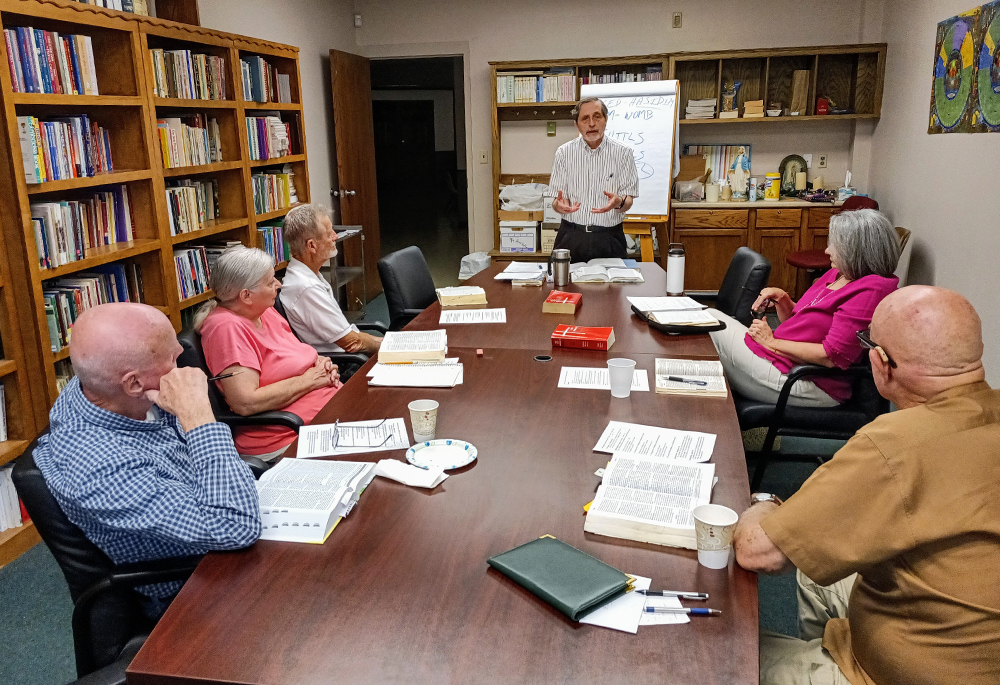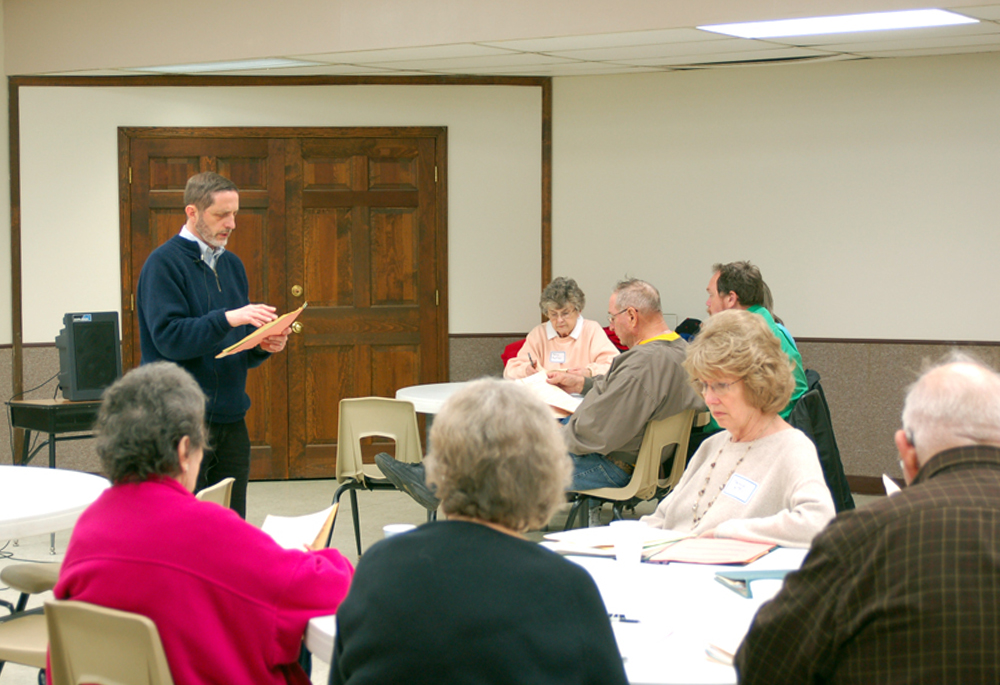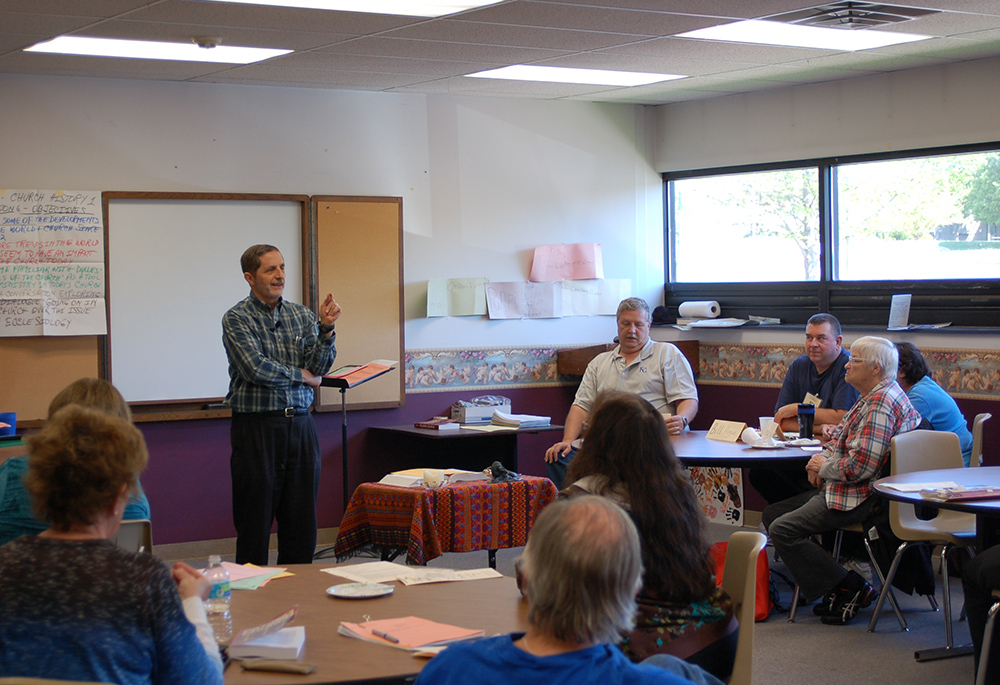
Biagio Mazza, an adult faith formation and religious educator for nearly 50 years, leading adult formation at St. Sabina Parish in Belton, Missouri (Courtesy of Biagio Mazza)
After working for 12 years as a religious educator of both children and adults in the Archdiocese of New York, in July 1988, I accepted a ministry position at the Center for Pastoral Life and Ministry in the Diocese of Kansas City-St. Joseph, Missouri.
For several years I had been searching for a position that would allow me to focus exclusively on adult faith formation, and the center proved to be just what I had always desired. I worked with the center's very professional pastoral staff for almost 18 years, until the center was officially disbanded by then-Bishop Robert Finn, who implemented a more traditional view of church and ministry.
I was then invited by a local pastor in the diocese to continue my adult faith formation ministry at St. Sabina Parish in Belton, Missouri, south of Kansas City. In May 2006, I began my parish ministry and continued to focus on adult faith formation ministry for an additional 17 years in the parish. In June of this year, I felt that it was time to retire, and I proceeded to leave the parish setting.
As I reflect on my ministry and faith journey since coming to the Kansas City diocese, I wanted to share some things I learned along the way regarding the meaning and significance that adult faith formation has had for me all these years.

Biagio Mazza, an adult faith formation and religious educator for nearly 50 years, leading adult formation at St. Sabina Parish in Belton, Missouri (Courtesy of Biagio Mazza)
1. Adult faith formation is an essential component of what it means to be church.
The institutional church must commit itself to promote and provide the best adult faith formation possible at both the diocesan and parish level. While Catholic and parish schools have an important role in educating and forming elementary and high school children, much more resources have to be allocated for the education and faith formation of adults. In so doing, the community forms adults who have appropriated their faith into their lived experience and in turn, model Christian living.
2. Adults desire to appropriate the faith in a way that is consistent with their lived experience, linking faith to the reality of their everyday lives.
A great hunger exists among faith-filled adults for proper education and formation based on Vatican II teachings and its vision of church and discipleship. Once exposed to the fullness of Christian faith and tradition through the lenses of Vatican II, adults begin to appreciate and appropriate their faith for themselves. They learn how to reflect on the values being offered, to articulate how those values cohere with their lived experience, and consequently freely choose to appropriate for themselves what speaks to them of God and their faith journey.
3. Adults desire to be treated as adults.
When it comes to both the good and the not-so-good of church history, theology, biblical interpretation, moral decision making and so on, adults want to know the fullness of the truth of what really happened. They are not content with a triumphalist telling of the story, but favor a telling that manifests both the goodness and the shortcomings of the tradition. Often the phrases that I consistently hear are "Why weren't we told this before ..." or "If only I knew this then ..." or "I have never heard that before ..."

Biagio Mazza, an adult faith formation and religious educator for nearly 50 years, leading adult formation at St. Sabina Parish in Belton, Missouri (Courtesy of Biagio Mazza)
4. Adults need to be affirmed in their adult relationship to God in and through Jesus. They need to know:
- That God loves them in and through the very messiness of life.
- That they are created with freedom to choose how that love relationship will unfold in their lives.
- That they have a brain that they are to use in correlation with their conscience, that inner sanctuary between themselves and God in which no one can interfere.
- That we are all called to accompany one another on our faith journeys, helping one another to see how God is present in life's complexities and challenges.
5. Adult faith formation is more expansive than catechesis.
Catechesis focuses on what the church teaches and why. Faith formation includes catechesis but also exposes adults to the richness and variety of both past tradition and new developments in various fields like theology, Scripture, liturgy and morality. Once exposed, they can use all that they have learned as a guide to form their conscience and act in accordance with it.
6. Vatican II linked the call and responsibility of ministry to one's baptismal call and commitment.
In so doing, ministry, or service to God's human family, was forever severed as the exclusive right of the ordained. All baptized are called to model Christ, putting their freely given gifts at the service of all God's people wherever they happen to be planted in God's vineyard.
7. Faith formation on any level, especially with adults, is essentially a training in the art of synodality.
Synodality presumes that the Spirit speaks in and through the lived experience of all God's people. Faith formation enables personal encounters with one another, which lead to active listening to one another, so as to hear the Spirit speaking. Faith formation involves taking one another seriously when it comes to each person sharing how God operates in their lives. Faith formation provides the setting in which this encounter can take place on an adult, faith-filled and engaging manner that respects the wisdom and dignity of all participants.
Advertisement
The late Kansas City-St. Joseph Bishop John Sullivan, who first hired me for this diocese, had a vision of church that saw adult faith formation as its essential and most important component. Two of his consistent sayings have remained with me all these years:
- Even if we had more than enough priests, there would still be a need for lay faith formation, for we are all church, called to put our gifts at the service of one another.
- Your ministry as faith formation facilitators is to work yourselves out of a job, by forming and training the ministers and trainers of the future.
In all the faith formation offerings that I facilitated in my close to 50 years of ministry in various settings, I strove to adhere to this vision of church by implementing these principles of adult faith formation.
Even when I faced pushback from church authorities, often at the cost of my employment, I still continued to be a facilitator that enabled others to appreciate the fullness of their Catholic tradition and appropriate the faith for themselves. Even in my retirement I plan to continue using my gifts to facilitate adult faith formation opportunities. There is no retirement from serving God's people.







